

4 Steps for Renting with Emotional Support Animal Successfully
by Lena Park
Last updated: July 8, 2025
Verified and Approved by:
Angela Morris,
MSW, LCSW
Fact Checked

Overview
Renting successfully with an emotional support animal (ESA) can be a challenging journey, especially for those managing mental health issues. It’s essential to understand your rights and the emotional impact of navigating housing situations. Knowing that you have protections under the Fair Housing Act can provide a sense of security and empowerment. Gathering necessary documentation, such as a valid ESA letter, is a crucial step in advocating for your needs.
Effective communication with landlords is vital. Have you ever felt anxious about discussing your ESA with a landlord? Fostering respectful dialogue can help ease those concerns. It’s important to remember that you are not alone in this process; many individuals face similar challenges. By approaching these conversations with empathy and understanding, you can create a supportive environment for yourself and your ESA.
Navigating potential challenges may feel daunting, but it’s essential to recognize that these actions empower ESA owners to combat discrimination in housing. You deserve to feel safe and supported in your living situation. Remember, the journey may be tough, but there are compassionate solutions available to help you along the way.
Introduction
Understanding the intricacies of renting with an emotional support animal (ESA) is crucial for those who depend on these companions for mental health support. Many individuals face emotional challenges when seeking housing that accommodates their needs, and it can often feel overwhelming. As awareness of the rights and regulations surrounding ESAs continues to grow, there is hope for securing appropriate housing. However, the complexities of landlord negotiations and legal documentation can be daunting.
How can ESA owners effectively advocate for their rights while ensuring a smooth rental experience? The ESA letter serves as a compassionate solution, providing the necessary support to navigate these challenges.
Understand Emotional Support Animals and Their Rights
Emotional assistance creatures (ESAs) serve as comforting companions for those navigating the challenges of mental health difficulties. Unlike assistance animals, which undergo specialized training to perform specific tasks for individuals with disabilities, ESAs do not require such training. The Fair Housing Act (FHA) grants individuals with ESAs the right to reasonable accommodations in housing, ensuring that landlords cannot deny them based solely on pet policies. This legal protection is vital for allowing individuals to live harmoniously with their emotional assistance animals, particularly in pet-restricted environments.
Understanding your rights as an ESA owner is essential. This includes the ability to request accommodations and knowing the necessary documentation to support your request. Familiarizing yourself with these regulations can ease the process of renting with an emotional support animal and assist you in navigating potential challenges. For instance, in states like California and Colorado, specific regulations are designed to protect the interests of ESA owners, allowing them to reside with their pets in rental properties. Conversely, states such as Alabama, Alaska, and Arkansas lack special access privileges for ESAs, underscoring the importance of being informed about state-specific regulations.
It is also crucial to distinguish between ESAs and service animals. While service animals are trained to assist with specific disabilities, ESAs primarily provide emotional support. This distinction can impact the privileges and accommodations available to their owners. Mental health experts emphasize that having an emotional support network, including ESAs, can enhance resilience and coping strategies during tough times. By grasping these nuances, ESA owners can effectively advocate for their needs and ensure they receive the support they deserve.
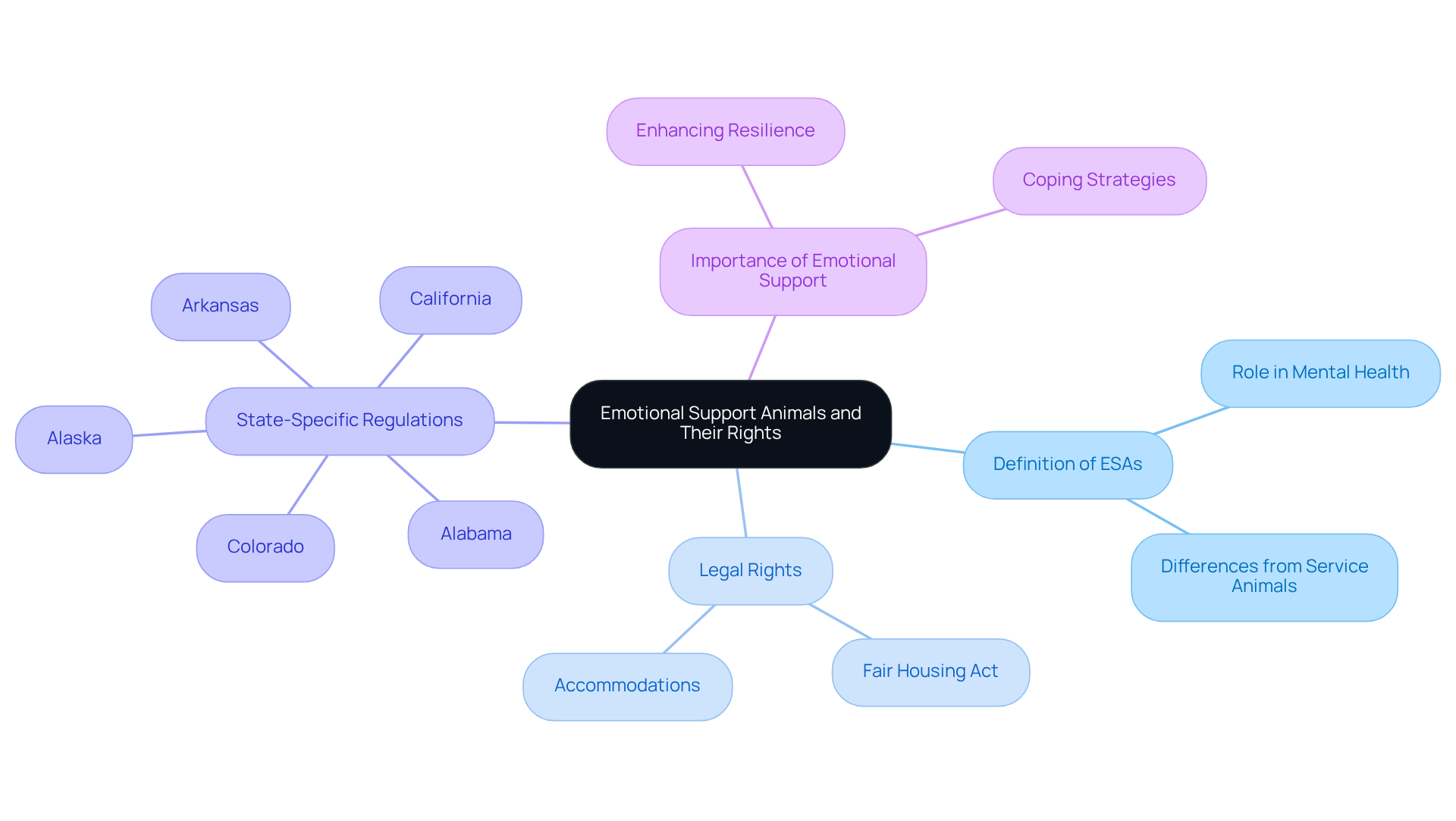
Gather Necessary Documentation for Your ESA
Renting with emotional support animal (ESA) can feel overwhelming, especially when navigating the necessary documentation. It’s crucial to gather the right paperwork, with the ESA letter from a licensed mental health professional being the most essential. This letter should clearly state that you have a qualifying mental health condition and that the ESA is a vital part of your treatment plan, helping to ease symptoms related to your condition. Including the professional’s contact information, license number, and signature is important to ensure its validity.
Additionally, keeping copies of other relevant documents, such as medical records or previous correspondence with your therapist, can strengthen your case if needed. It’s worth noting that many people share your journey; statistics show that 75% of renters own at least one pet, and pet owners often rent for an average of eight months longer than non-pet owners. This underscores the importance of having the proper documentation when renting with emotional support animal to effectively navigate housing challenges.
Wellness Wag offers a simple online process to obtain a legitimate ESA letter. By taking a quick assessment, you can connect with a licensed medical professional for a personalized consultation and thorough evaluation. This not only helps you adhere to housing regulations but also provides crucial legal protections under the Fair Housing Act, empowering you to advocate for your needs when renting with an emotional support animal in pet-restricted accommodations. Remember, you are not alone in this journey, and support is available to help you find your way.
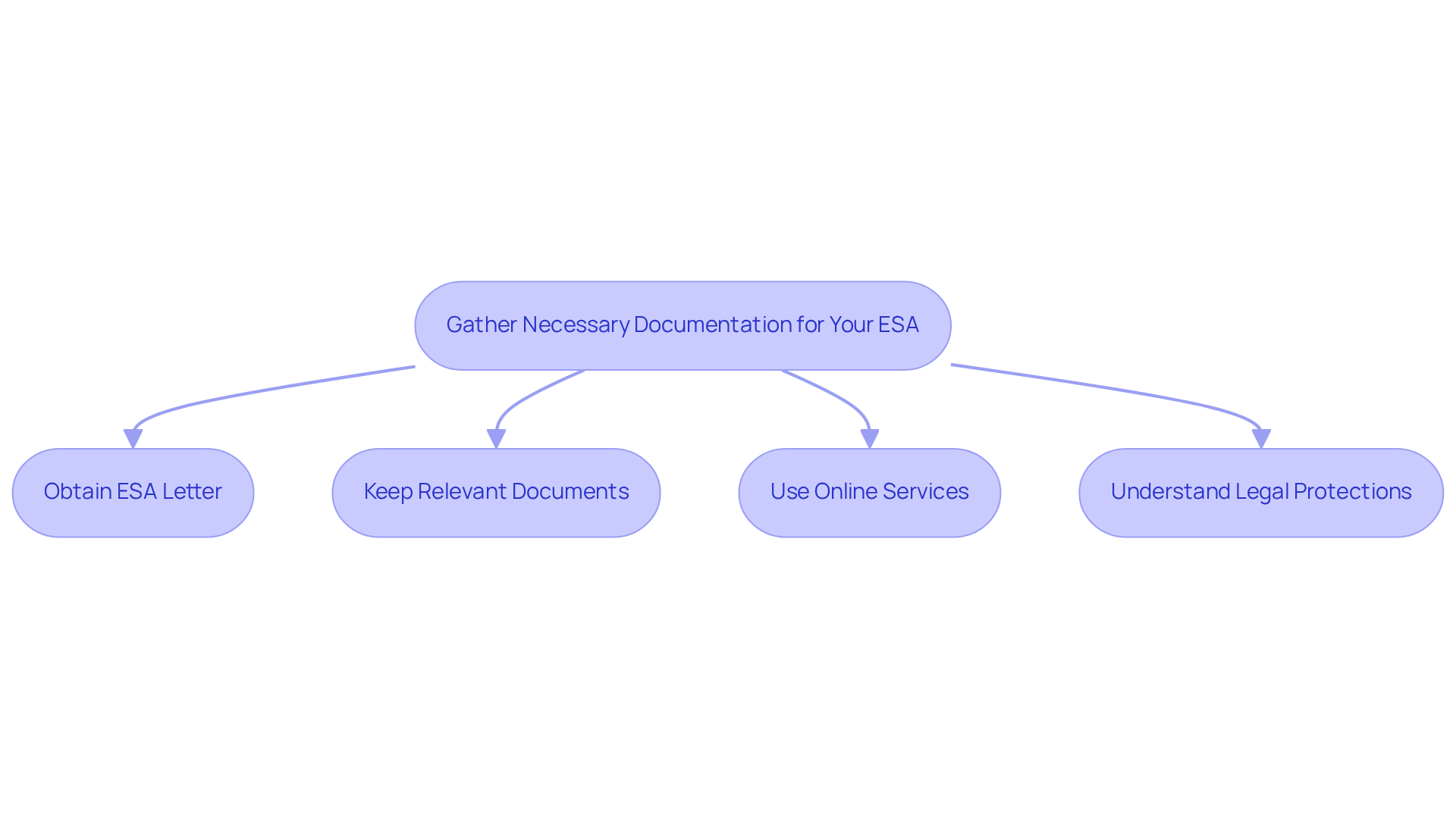
Communicate Your ESA Needs to Landlords
When discussing renting with an emotional support animal (ESA) with your landlord, it’s vital to communicate clearly and respectfully. Begin by sharing your need for an ESA and provide your official ESA letter, which serves as proof of your rights under the Fair Housing Act when it comes to renting with an emotional support animal. Emphasize how your ESA enhances your mental well-being, highlighting the therapeutic benefits they offer. For example, studies indicate that individuals with secure attachments to their pets experience 25% lower anxiety levels compared to those without pets.
Understanding the legal rights of service dog owners is also crucial, as this knowledge helps clarify the differences between ESAs and service dogs. Service dog owners enjoy full public access privileges under the Americans with Disabilities Act (ADA), which may be relevant in your discussions.
Consider suggesting an in-person meeting to address any concerns your landlord might have. This personal touch can foster a more constructive dialogue. During the conversation, focus on your entitlements and be prepared to answer any questions or concerns they may raise. Effective communication strategies include being well-informed about the legal distinctions between ESAs and regular pets, especially in the context of renting with an emotional support animal, as well as understanding your landlord’s responsibilities under the Fair Housing Act.
To simplify the process of obtaining your ESA letter, take advantage of Wellness Wag’s quick assessment. After submitting the required forms, you’ll connect with a licensed medical professional for a personalized consultation. Keep a record of all communications, as this can be crucial if any disputes arise. By approaching the discussion with empathy and preparedness, you can create a positive atmosphere that encourages understanding and compliance, ultimately leading to a successful negotiation regarding renting with an emotional support animal.
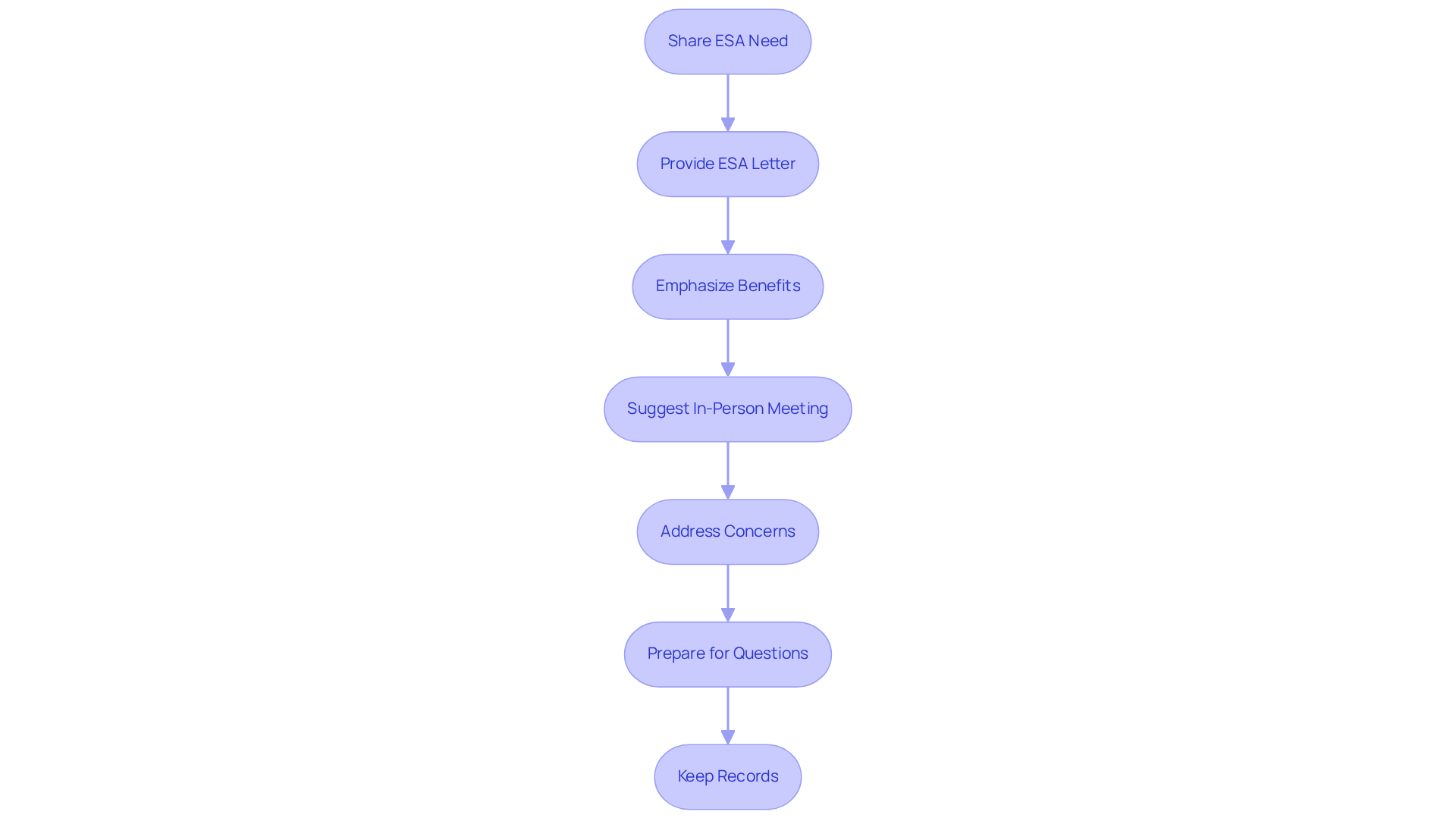
Navigate Challenges When Renting with an ESA
Renting with an emotional support animal can be a challenging journey, particularly when landlords may not fully understand ESA laws. It’s disheartening to know that a significant percentage of landlords—around 52.61%—have encountered complaints related to disability discrimination. This underscores the urgent need for increased awareness of ESA regulations. Many individuals face initial refusals of ESA requests when it comes to renting with an emotional support animal, often stemming from misunderstandings about the legal protections provided under the Fair Housing Act. If you find yourself in this situation, it’s important to calmly affirm your rights and provide the necessary documentation that clarifies these laws. Remember, resources like the Fair Housing Act state that landlords cannot deny your request for renting with emotional support animal ownership, nor can they impose additional fees typically associated with pets.
If a landlord continues to deny your request, seeking legal advice or reaching out to a local housing authority may prove beneficial. Approaching these discussions with a respectful and cooperative demeanor can often lead to a more favorable resolution. Moreover, recent studies reveal that 88% of ESA owners report a positive impact on their mental health from their pets, emphasizing the vital role these companions play in managing conditions such as anxiety and depression.
As the demand for ESAs grows—search interest for terms like ‘ESA Letter’ is projected to reach 105,000 searches in 2025—it is essential for both tenants and landlords to stay informed about their rights and responsibilities. Advocates stress that understanding the nuances of ESA laws can help prevent costly legal disputes and create a more supportive rental environment for everyone involved.
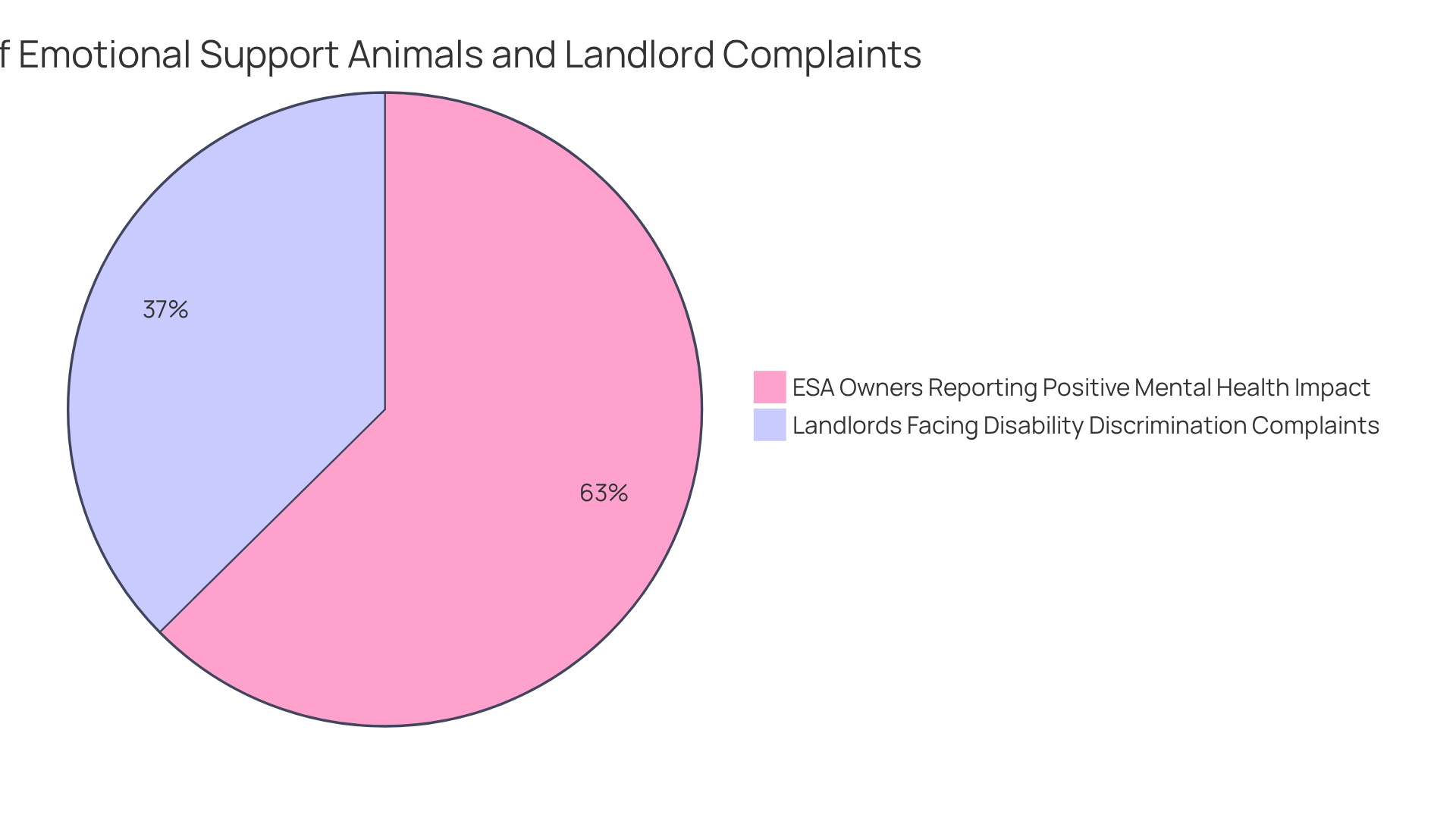
Resources for ESA Owners
Navigating the journey of renting with an emotional support animal can be challenging, but it’s important to know that you are not alone in this process. Here are some resources that can help you along the way:
-
Fair Housing Act Information – Understanding your rights as an ESA owner is crucial. The U.S. Department of Housing and Urban Development (HUD) offers comprehensive details about the Fair Housing Act (FHA). This law requires landlords to make reasonable accommodations for service animals and ESAs, even if they have ‘no pets’ policies. Knowing this can empower you in your rental journey.
-
Local Housing Authorities – Your local housing authority can be a valuable ally. They provide guidance on ESA laws specific to your area, helping you understand your rights under the FHA. Don’t hesitate to reach out to them for support.
-
Mental Health Organizations – Connecting with organizations focused on mental health can offer further assistance and resources related to ESAs. These organizations can share valuable insights on how ESAs can help manage mental health conditions and may provide documentation to support your housing needs.
-
Legal Aid Services – If you find yourself facing significant challenges, legal aid services can help you understand your entitlements and options. It’s important to note that many low-income Americans encounter civil legal problems without adequate help. Accessing these services can be vital in navigating disputes with landlords regarding your ESA.
By leveraging these resources, you can advocate for your rights and ensure a smoother renting with emotional support animal experience. Remember, you are taking important steps towards creating a supportive environment for yourself, and there are people and organizations ready to help you along the way.
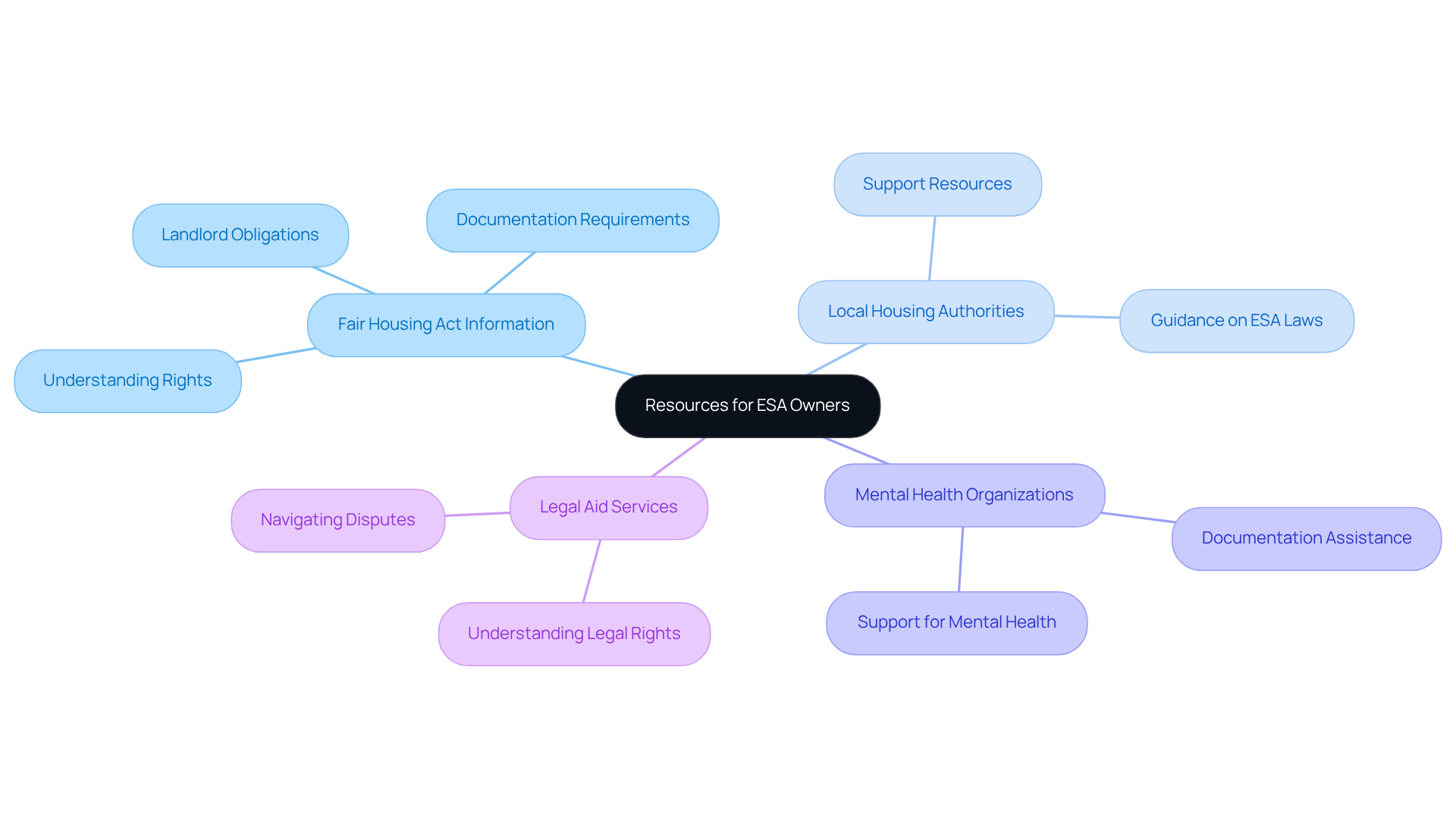
Conclusion
Renting with an emotional support animal (ESA) can feel overwhelming, yet it is a journey filled with hope and understanding. It’s essential to know your rights under the Fair Housing Act and to gather the necessary documentation to support your ESA needs. By being informed and proactive, you can navigate the rental process with confidence, ensuring your beloved companion is welcomed into your home.
Many individuals face emotional challenges when seeking housing with an ESA. Understanding the distinction between ESAs and service animals, obtaining a legitimate ESA letter, and communicating clearly with landlords are all vital steps. Recognizing the legal protections available to you can ease the renting experience, allowing you to focus on the joy your ESA brings. Resources such as local housing authorities and mental health organizations are here to support you throughout this process, providing guidance and assistance.
The role of emotional support animals in enhancing mental well-being is profound. As interest in ESAs continues to grow, it becomes increasingly important for both tenants and landlords to stay informed about their rights and responsibilities. Advocating for your needs, while fostering respectful dialogue, can create a more inclusive and supportive rental environment. Embrace this journey with your emotional support animal, knowing that help and resources are available to create a harmonious living situation. You are not alone in this; support is within reach, and together we can navigate the path to a nurturing home.
Frequently Asked Questions
What is an Emotional Support Animal (ESA)?
An Emotional Support Animal (ESA) is a comforting companion for individuals facing mental health challenges. Unlike service animals, ESAs do not require specialized training to perform specific tasks.
What rights do ESA owners have under the Fair Housing Act (FHA)?
The Fair Housing Act grants ESA owners the right to reasonable accommodations in housing, meaning landlords cannot deny them based solely on pet policies.
Why is it important to understand your rights as an ESA owner?
Understanding your rights helps you request accommodations and know the necessary documentation to support your request, making it easier to rent with an ESA.
Are there specific regulations for ESAs in different states?
Yes, some states, like California and Colorado, have regulations protecting ESA owners, while others, like Alabama, Alaska, and Arkansas, lack special access privileges for ESAs.
How do ESAs differ from service animals?
ESAs primarily provide emotional support and do not undergo specific training, whereas service animals are trained to assist individuals with specific disabilities.
What documentation is necessary for renting with an ESA?
The most essential document is an ESA letter from a licensed mental health professional, stating that you have a qualifying mental health condition and that the ESA is part of your treatment plan.
What should be included in the ESA letter?
The ESA letter should include the mental health professional’s contact information, license number, and signature to ensure its validity.
How can I strengthen my case when renting with an ESA?
Keeping copies of relevant documents, such as medical records or correspondence with your therapist, can help strengthen your case.
What resources are available for obtaining an ESA letter?
Wellness Wag offers an online process to obtain a legitimate ESA letter by connecting you with a licensed medical professional for a consultation and evaluation.
What legal protections do ESA owners have?
ESA owners are protected under the Fair Housing Act, which empowers them to advocate for their needs when renting in pet-restricted accommodations.
Certify Your Emotional Support Animal Today

Why You Can Rely on Us?
At Wellness Wag, we believe your pet deserves care rooted in both science and compassion. Each article is carefully researched, written in clear language for pet owners, and then reviewed by qualified professionals to ensure the information is evidence-based, current, and practical for real-life care. Our goal is to help you feel confident in making informed decisions about your pet’s health and well-being.
Reviewed by
Angela Morris, MSW, LCSW
Angela is a licensed clinical social worker with 20 years of experience in patient advocacy and community mental health. She has assisted numerous clients with ESA evaluations and brings a deep understanding of disability accommodations, ensuring that all information is accurate, supportive, and practical.

Written by :
Lena Park
Last Updated :
July 8, 2025












